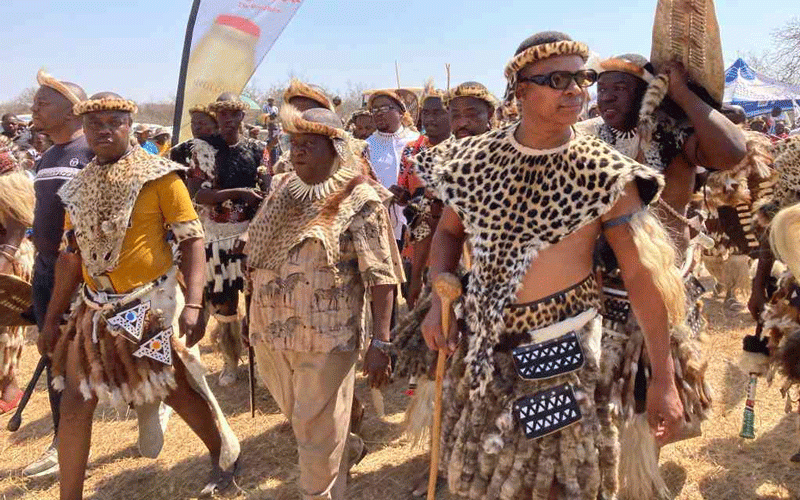
The Mthwakazi Republic Party (MRP) notes with grave concern and firm condemnation the latest announcement by the Zanu PF–led government that heritage sites linked to King Mzilikazi kaMatshobane, the founding father of the Ndebele nation, will be absorbed into what it calls the 2026 Independence Legacy Projects.
While the government disguises this initiative as a gesture of “national heritage preservation” and “tourism development,” a deeper examination reveals a deliberate and premeditated move to seize cultural control, rewrite the history of Mthwakazi, and neutralise the living memory of Ndebelehood under the homogenising banner of a false “Zimbabwean nationalism.”
This development confirms the MRP’s long-standing warning — which I issued earlier this year as the president of the party — that the Zanu PF government is advancing an agenda to appropriate all cultural rights and institutions in Mthwakazi, stripping the people of their historical identity, sacred traditions, and custodial authority over their own heritage.
King Mzilikazi’s resting place at Entumbane, the royal memorial at Mhlahlandlela, and associated sites such as the graves of Queens Lozikeyi and Loziba, as well as the Gadade Memorial Site, are not mere monuments.
They are sacred foundations of Mthwakazi identity — sites of royal ancestry, spiritual communion, and collective remembrance.
For generations, these sites have been guarded by traditional custodians, notably the Khumalo royal family and local communities, whose stewardship has preserved their sanctity beyond the reach of both colonial and post-colonial interference.
To the Ndebele people, King Mzilikazi’s grave is not a tourist attraction. It is a sacred shrine, approached with reverence and governed by ritual law.
The decision to open such a site to mass tourism and state administration without the full consent and control of its traditional custodians and Mthwakazi people’s consent is therefore not a gesture of respect — it is a spiritual and cultural violation.
- Feature: Communities look beyond Cyclone Idai
- Revamped Zimre lifts profits by 78%
- Chinese chrome smelters wreak havoc on Gweru’s roads
- Revamped Zimre lifts profits by 78%
Keep Reading
The pattern is unmistakable
For years, the Zanu PF regime has weaponised the language of “national unity” and “heritage preservation” to entrench control over every sphere of public life.
What it now calls heritage management is, in fact, cultural colonisation—a modern strategy to absorb and sanitise Mthwakazi’s distinct historical narrative within a Shona-centric national story.
Through the National Museums and Monuments of Zimbabwe (NMMZ), the government is systematically converting sacred Mthwakazi heritage into state property, legally declared “national monuments” under the Monuments and Relics Act — a colonial statute the regime conveniently retains to centralise cultural power.
Once declared, these sites fall under the administrative and interpretive control of state institutions, effectively dispossessing local communities of their right to determine how their own history is represented, commemorated, and transmitted to future generations.
This is not preservation
It is the appropriation of identity and the erasure of autonomy — a continuation of the same colonial strategy that once sought to break the spirit of the Ndebele nation by silencing its royal lineage and denying its political existence.
Over the years, a series of statements and actions by political figures and certain self-proclaimed traditional leaders from outside Matabeleland have echoed a disturbing theme: that Mthwakazi’s heritage must be “integrated” into a single national narrative defined from Harare.
Such pronouncements — often tolerated or amplified by state institutions — have served to delegitimise Ndebele traditions, mock sacred customs, and undermine the authority of the Khumalo royal lineage.
By placing King Mzilikazi’s resting place and other royal memorials under direct state management, the Zanu PF government continues this continuum of hegemonic practice.
It converts the instruments of cultural remembrance into tools of political control, ensuring that future generations learn a version of history cleansed of the independence, dignity, and spiritual sovereignty that once defined the Ndebele nation.
By embedding King Mzilikazi’s heritage into the so-called “Independence Legacy Projects,” the government attempts to reposition the King — once a symbol of sovereignty and resistance — within the Zanu PF liberation mythology.
This deliberate manipulation turns the founding monarch of Mthwakazi, who built a sovereign kingdom long before colonial conquest, into a component of “Zimbabwe’s liberation heritage.”
Such reframing dilutes his historical role, turning a story of pre-colonial independence and Ndebele statehood into a decorative subplot in a state-manufactured narrative of “national unity.”
The result is the symbolic neutralisation of Mthwakazi’s historical consciousness.
The same regime that suppresses the coronation of a Ndebele King, refuses to officially recognise Mzilikazi Day, and marginalises the teaching of Ndebele history in schools, now claims the authority to “preserve” what it has long sought to extinguish.
This hypocrisy exposes the real intent:
to control the memory of resistance so that it can no longer inspire present-day demands for justice, equality, and self-determination.
Section 63 of the Constitution of Zimbabwe guarantees every person the right to use their language and participate in the cultural life of their choice.
The forced takeover of Mthwakazi heritage sites without genuine consent from their custodians constitutes a direct violation of these rights.
Furthermore, while the Constitution recognises the role of traditional leaders under Section 281, the same government undermines that authority by installing state agencies as “custodians” of sites whose meaning lies beyond bureaucratic reach.
This is a breach of cultural sovereignty and a profound act of bad faith against the people of Matabeleland.
The government’s actions regarding King Mzilikazi’s heritage form part of a wider pattern of systematic cultural suppression in Mthwakazi, manifesting through:
- The obstruction of the restoration of the Ndebele monarchy;
- The exclusion of Matabeleland communities from decision-making in heritage, education, and resource governance;
- The marginalisation of the Ndebele language and history in state institutions;
- The commercial exploitation of sacred sites for political propaganda and outside gain;
- The persistent manipulation of cultural narratives to promote a single, centralised identity.
Each of these actions erodes the historical foundations of Mthwakazi and seeks to obliterate its distinct cultural and political identity under the veneer of “national integration.”
We assert that King Mzilikazi’s grave and memorials are sacred and must remain under the custodianship of the Khumalo royal family, local traditional authorities, and the Mthwakazi people.
What Zanu PF presents as “heritage preservation” is in truth an extension of state capture into the realm of culture and memory — an act of post-colonial colonisation seeking to dictate how Mthwakazi sees itself and remembers its ancestors.
*Mqondisi Moyo is the president of Mthwakazi Republic Party.










